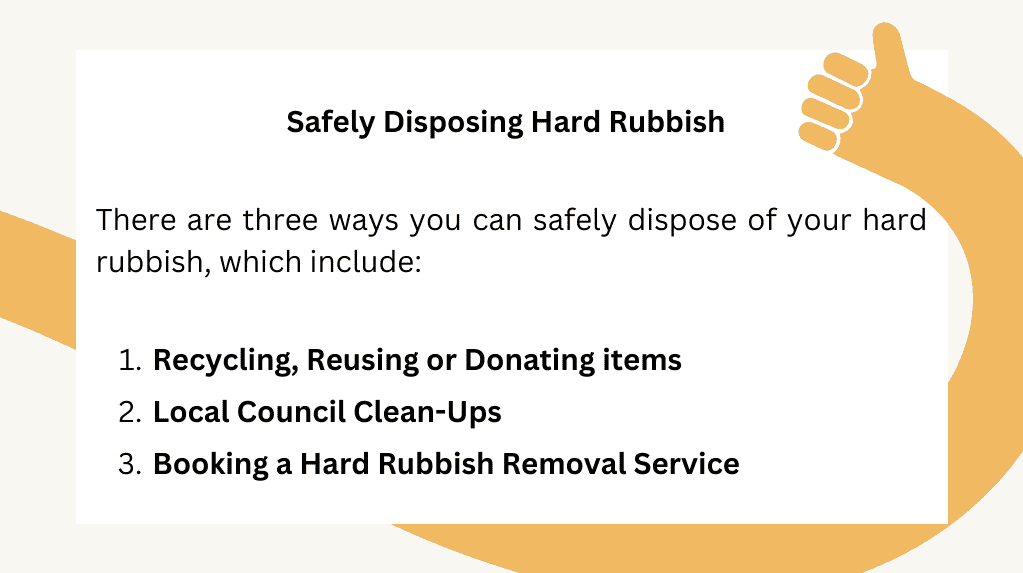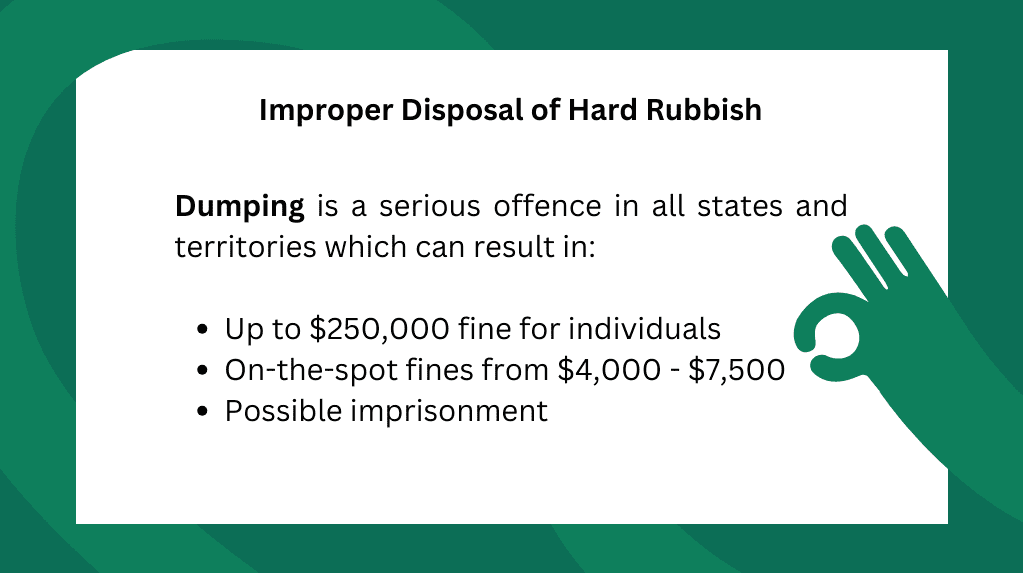
Getting rid of old furniture, broken appliances, or damaged electronics from your home can be quite the hassle — furniture and bulky items won’t fit in the council-provided bins and they’re difficult to move around. At the same time, storing them in your home or garage isn’t ideal as they’re going to take up valuable space and contribute to clutter.
So, considering that hard rubbish doesn’t end up in the same waste disposal facilities as regular household waste, what’s the right way to dispose of hard rubbish? And where does it end up after it’s collected?
What is Considered ‘Hard Rubbish’?
Before we get into the disposal methods, let’s be clear on the items that are considered to be hard rubbish. In general, hard rubbish refers to large or bulky items that can’t be placed into regular rubbish bins. Common examples of hard rubbish include:
- Appliances — dishwashers, refrigerators, ovens, barbeques
- Furniture — bed frames, wardrobes, tables and chairs, sofas
- Electronics — large TVs, home theatre systems, vacuum cleaners
- Equipment — kayaks, lawnmowers, large exercise weights

How Can you Dispose of Hard Rubbish?
Anything that does not fit easily into your red bin should not be put in there. Doing so will not only damage the bin but potentially pose safety and operational hazards to bin collectors.
Simultaneously, you can’t just leave your rubbish on the side of the road outside of hard rubbish collection. Dumping any hard rubbish or waste out on the kerb is considered an offence in all parts of Australia, and you may face costly consequences in the form of fines or even jail time.
Disposing of hard rubbish properly can be done in 3 ways:
Recycle, Reuse, or Donate (where possible)
Recycling rubbish may not always mean that items have to be stripped apart or broken down at a facility. There are many ways to reuse parts of hard rubbish, even if they are broken. This is especially true for wood-items as they can typically be disassembled easily and reshaped with DIY woodworking for other uses.
In some cases, the item you want to dispose of is still in working condition. Instead of simply throwing it away, you could give it a new lease of life by donating it to your local op shop or community.

Local Council Clean-ups
Most councils across major Australian cities offer limited free collection services for hard rubbish to households within their jurisdiction. With this service, homeowners can leave out hard rubbish on the kerb prior to council collection days and have them removed from the property.
Depending on where your property is located, this service may require you to either book a clean-up service or wait for a set date and time for collection. Check your council’s website to find out what type of collection is offered and when.
Book a Hard Rubbish Removal Service
If you need to get rid of hard rubbish urgently and can’t wait for council clean-ups to come around, your best option is to book a hard rubbish removal service. A professional removal service will come directly to your property, load the hard rubbish items onto the transport, and safely deliver the items to an appropriate waste processing facility. This is also the fastest and most convenient way to get rid of hard rubbish items.
Where Does Hard Rubbish go When it is Collected?
So, where does hard rubbish eventually end up after collection by the council or a hard rubbish removal service? Well, it depends on what the collected items are.
In some city councils, hard rubbish is sorted through after collection to determine if any items can be salvaged through repair or reuse. These can range from bicycles to mattresses and will depend on the condition of the item.
Where possible, collected hard rubbish will be recycled if they are not able to be reused. The recycling process differs greatly from material to material, and while efforts are being made across Australia to boost recycling capabilities, only a small percentage of hard rubbish usually ends up being fully recycled.
Most collected hard rubbish items are, sadly, sent to landfills where they add to the ever-increasing amount of waste that is produced.

What Happens when Hard Rubbish is not Disposed of Correctly?
Improper disposal of hard rubbish is considered dumping — a serious offence in all states and territories that will land responsible homeowners in hot water. Fines for dumping in NSW, for example, can reach up to $250,000 for individuals, along with on-the-spot fines from $4,000 to $7,500.
There’s also the possibility of imprisonment as punishment, especially for repeated offences. Our advice? Do the right thing and call in a hard rubbish removal company to help you instead of leaving it on the kerb and risking a dumping offence.
How Much Does Hard Rubbish Disposal Cost?
The costs for hard rubbish disposal across Australia can vary depending on where you are located, as well as the availability of collection services in your area.
Some council clean ups offer this service for free, but only up to a limit. Once you’ve used all the available clean ups, you may need to pay up to $100 for additional council collection services.
Hard rubbish removal companies also have their own prices, but these are usually cheaper than booking additional council clean ups. At Ridly rubbish removal, our hard rubbish pick up services in Sydney start from $69 and are available throughout all days and times of the week. If you’re looking for hard rubbish disposal in Sydney, we can help no matter where you are — whether you’re in the Inner West, North Sydney, Western Suburbs, Eastern Suburbs, or down in the Sutherland Shire.